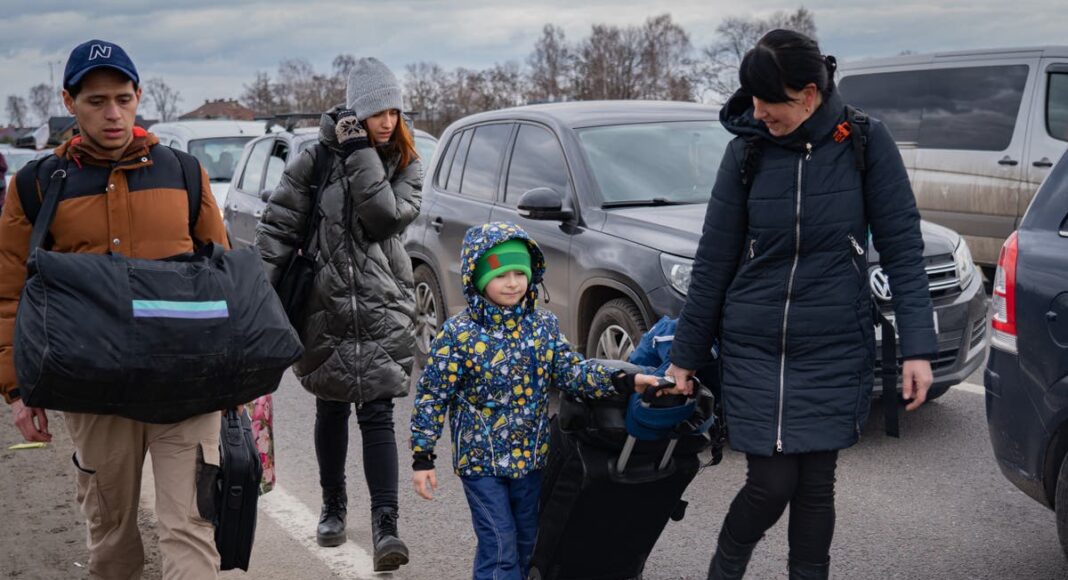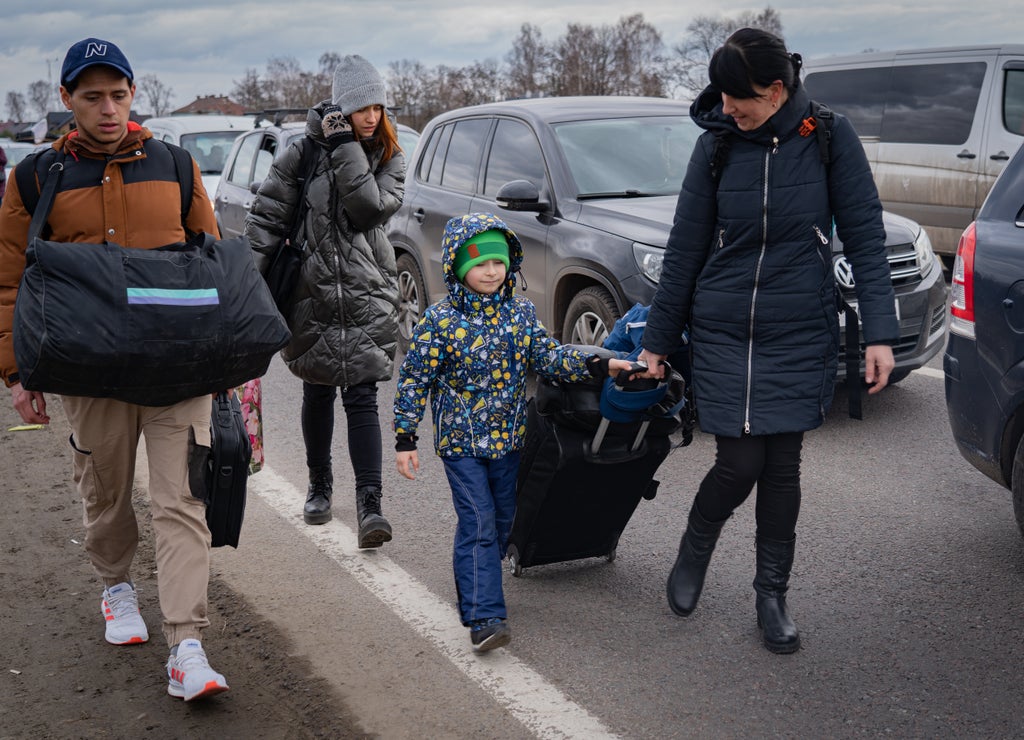Emerging from the darkness of the freezing night, the pale shadows of thousands of men, women and children drag small bags, their lives and their pets behind them.
It is minus 4C, and the road is scarred with ice. People, who have fled airstrikes and shelling from as far away as 1,000km (620 miles) in eastern Ukraine, make the final 12-hour march on foot to the border with Poland.
Some too exhausted to go on for now, give up and try to tuck up their children on the side of the road, using blankets, towels, and coats against the bitter cold. Alongside those on foot, is a line of cars, sometimes three vehicles deep, that stretches for 50km (31 miles) like a funerary procession.
“We spent three days looking for a car and in the end hitchhiked our way here,” says Svetlana, 45, with her two children, the youngest just seven years old, who was trying to help her drag a suitcase the last 50km of their journey.
The family-of-four lived near a military airport that was being bombed in Ivano-Frankivsk, western Ukraine. They say they fled under airstrikes but the father stayed behind.
“We have no option but to walk the rest. There is no other way. I will carry my child and my bag on my shoulders if I have to. It’s chaos.”
To her right, a group of Iraqi and Palestinians who left conflict in the Middle East to live in the comparative safety of Ukraine years ago were also making their way to the border.
“We came by train from Kyiv but the train driver had to halt it and turn off the lights as there was so much shooting and bombing everywhere, and they thought the lights might make the train a target,” says Omar, 27, from Baghdad whose wife is Ukrainian and was dragging as many of their belongings as he could carry.
People wait for a train to Poland at the railway station of the western Ukrainian city of Lviv
(AFP via )
“Two fighter jets roared above us an then a helicopter, and then explosions, it reminded me of the 2003 invasion of Iraq. We were so frightened,” he says.
The United Nations say more than 150,000 people have fled Russia’s shock invasion of Ukraine in just a few days, half of them to Poland. Many are also pouring into other neighbouring countries like Hungary, Moldova, Slovakia and even into Belarus, from where some Russian forces entered Ukraine.
But UN refugee officials admit this number is very conservative. The Polish deputy interior minister Panel Szefernaker said 100,000 people had crossed into his nation alone in just two days.
More and more are fleeing every minute as Russian forces press their assault on the capital, which came under ferocious strikes but also street battles on Saturday morning. The United Nations officials told The Independent that if the fighting drags on as many as 4 million people could be on the move.
This, Human Rights Watch’s refugee researcher Nadia Hardman said, could be “one of the largest displacement crises in recent European history”.
Ukrainians approaching the border at Shegnyi Medyka
(Bel Trew)
“This will once again test Europe’s commitment to fundamental principals such as a right to asylum,” she told The Independent, saying that for now, borders were open.
“We hope this holds true for everyone even those who are non-Ukrainians,” she added.
Shabia Mantoo, a UNHCR spokesperson, said the issue with Ukraine was that it was already home to thousands who had fled previous wars.
“There are already 5,000 refugees and asylum seekers in Ukraine from other conflicts [in] the Middle East,” she says.
“On top of that there are 854,000 internally displaced because of the protracted humanitarian crisis and conflict since 2014,” she adds. “There are people who are already displaced and could be forced to flee for a second time.”
At the border, thousands of people cram up against the barbed wire, desperate to get through.
In the freezing cold, many are wearing all the clothes they have to keep warm, after discarding the rest along the way. The long road to Poland is littered with abandoned suitcases and clothes as exhausted people dump belongings weighing them down. Makeshift soup kitchens have been set up by locals in the western regions to sustain those from further away on their long journey.
On the other side, dozens of Polish volunteers came with blankets, food and hot drinks to assist those who make it through. They try to find those fleeing places to stay, even in their own homes.
Polish authorities have set up processing centres to deal with the burgeoning refugee crisis.
Among the volunteers is Ukrainian citizen, Ksemia, who lives in Poland but who whose parents are trapped in eastern Ukraine.
She hands out blankets in floods of tears.
A brother and sister share a bowl of soup after they and their mother fled the Russian invasion of Ukraine and crossed the border, in Medyka
(Reuters)
“I just met a grandmother with a child, a 15 year old, both her parents are dead, they have nowhere to go. I am sending them to my home,” she says, shaking.
“My family can’t get here, it’s not possible right now. There is 40km of humans trying to get into Poland right now. I am so exhausted it doesn’t feel real.”
And there is no end in sight to the fighting. At least 198 Ukrainians, including three children, have been killed as a result of the invasion, the head of the Ukrainian Health Ministry was quoted by the Interfax news agency as saying on Saturday.
In the capital Kyiv, the mayor imposed a nightly curfew as citizens hunkered down in bunkers after a night of missile fire raining down on the city.
Russian forces pounded other Ukrainian cities with artillery and cruise missiles for a third day running, like the southeastern Ukrainian city of Melitopol, which Russia’s defence ministry said they had captured.
Anna Semyuk, 33, hugs her children, after a stranger took them across the border and kept them safe in Hungary
(Reuters)
Back at the border, desperation sets in. Angry crowds plead with border guards to let them through as the temperature drops below freezing.
There is some confusion over who can cross. Migrants and refugees from outside of Ukraine, or those without passports or paperwork, sit to one side. A man in tears says he was not allowed to cross.
“We were hiding in a bunker until it became too much and we were told the Russians would encircle the whole of Kyiv,” says Maria, (not her real name), who came from the capital and spent the last 10 hours walking with her two children through the night. They can barely walk a step further and huddle on a curb by the border gate.
“We thought we were going to die. And now we do not know where we are going to live.”
The Independent’s Refugees Welcome campaign is calling for the UK government to set up a resettlement scheme to give Ukrainians fleeing the invasion sanctuary in Britain.




